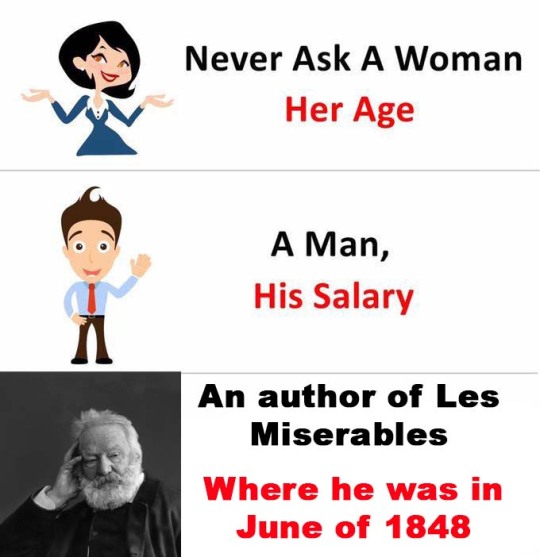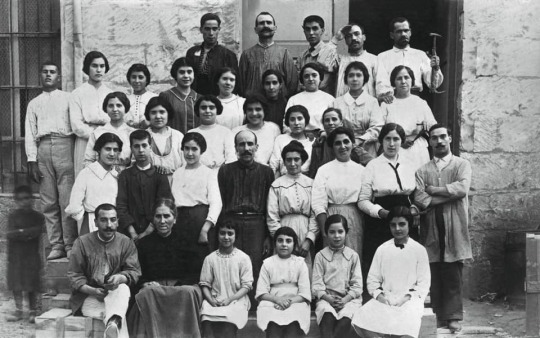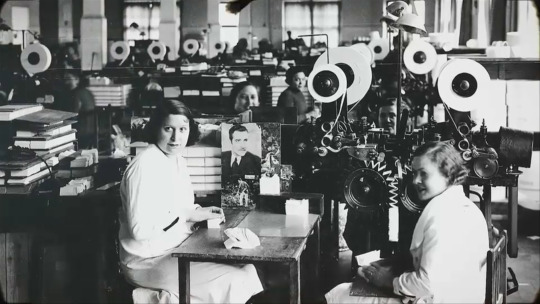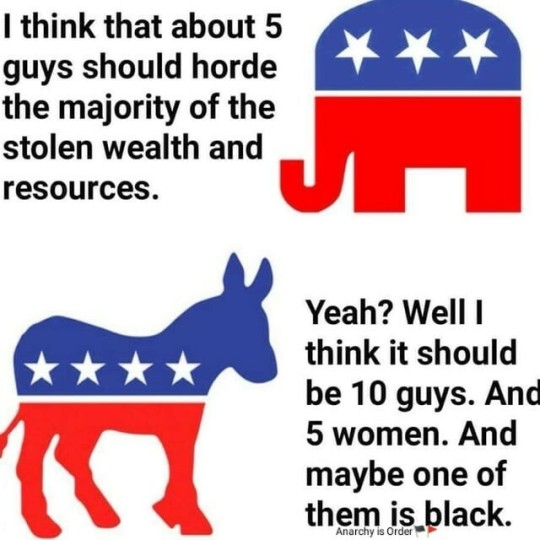#labor class war
Text
Bad King Richard got rich by exploiting workers at King’s Faire

Next Tuesday (Oct 31) at 10hPT, the Internet Archive is livestreaming my presentation on my recent book, The Internet Con.

King Richard's Faire is the largest renfaire in New England, and its owner, Dick Shapiro, extracts a reported $400k/day – a sum that is only possible thanks to systematic and likely illegal worker misclassification, which lets him pay performers sub-minimum wages and deny them benefits:
https://www.reddit.com/r/boston/comments/172267v/kings_faire_inc_aim%C3%A9e_bonnie_shapiro_nets_over/
Many of the performers at KRF are absolutely unpaid – these are the "villagers" – who mill about looking picturesque in exchange for free admission. They even have to buy their own turkey legs.
When the faire is rained out, all workers – "volunteers" and paid workers – are sent home without any compensation. Attendees are also sent home with rain-checks, many of which go unused (there's no refunds in the land of King Richard).
Staff work from 8am to 730pm and are paid a day-rate that works out to $6/hour. After heavy weather events, staff are ordered to show up early to do cleanup, but are not paid for their time. Staff don't get health benefits – instead, local community groups like the Elks put on fundraisers to cover the health-care costs of the performers.
Now, King Richard's worker mistreatment is not an outlier in the medieval reenactment industry. Think of how the knights at Medieval Times – who put on nightly, potentially lethal performances to generate profit for their employer – unionized in the face of exploitative labor relations. To add insult to injury, Medieval Times sued the union, arguing that its name – "Medieval Times Performers United" – was a trademark infringement:
https://www.huffpost.com/entry/medieval-times-sues-union-trademark_n_63485fa5e4b0b7f89f54546b
This trademark wheeze is the latest desperate tactic to be deployed by the ruling class in the face of a surging labor movement with broad public support. Starbucks – one of the world's most notorious unionbusters – is doing the same thing to its union, Starbucks Workers United:
https://seattle.eater.com/23923490/starbucks-workers-united-union-lawsuits-copyright-trademark-israel-hamas-palestine-social-media
These moves are wildly out of step with the current of public opinion, which has swung hard for union rights in a manner not seen in generations. The outpourings of public support for striking entertainment industry workers were handwaved away as exceptions driven by the public's love of actors and writers. But that doesn't explain the strong, ongoing support for the UAW in their strike against all of the Big Three automakers:
https://pro.morningconsult.com/instant-intel/uaw-strike-public-opinion-october-2023
Bosses have always tried to smash worker power by dividing workers – by race, gender, or "skill" – but workers are workers and solidarity is the source of worker power. That's why the whole labor movement backed Equity Stripper NoHo, the first strippers' union in a generation:
https://pluralistic.net/2023/09/14/prop-22-never-again/#norms-code-laws-markets
Creative workers are part of a class of workers who suffer from "vocational awe," the sense that because your job is satisfying and/or worthy, you don't deserve to get paid for it:
https://www.inthelibrarywiththeleadpipe.org/2018/vocational-awe/
(Think of joke about the father who finds his runaway son at the circus shoveling elephant shit: "Son, come home!" "What, and quit show-business?")
Creative workers have long been encouraged to see themselves as "independent businesspeople" – LLCs with MFAs – and this mind-zap is augmented with our bosses' repeated insistence that the unions are for big burly blue-collar workers, not ethereal dreamers and pencil-pushers. Our bosses tell this story because it discourages us from forming unions and demanding fair pay and good working conditions (obviously).
Think of J Edward Keyes, the cartoon villain who serves as editorial director of Bandcamp. When the workers Keyes managed formed the Bandcamp United union, Keyes called them "white-collar tech workers…appropriating the language of the legitimately oppressed," adding "Fuuuuuck Bandcamp United":
https://www.404media.co/bandcamp-editorial-director-fuuuuuck-bandcamp-united/
Keyes's contempt notwithstanding, it's clear why Bandcamp workers need a union – after the company was flipped twice in rapid succession, its new owners, Epic Games and Songtradr, fired all its unionized workers. Keyes responded to coverage of this mass firing by calling the Pitchfork reporters who wrote about it "absloute amateur journalists."
The attempt to divide-and-rule "knowledge workers" from "industrial workers" is a transparent bid to shatter solidarity and make it easier to abuse and exploit all workers. Thankfully, workers are wise to that gambit, and understand that when all kinds of workers struggle together, they win.
Take the UAW strikes: for many years, the UAW was an objectively bad union, ruled over by a dirty-tricking clique who sold out the membership. It's normal to blame workers for bad leaders, but the UAW old guard had rigged union elections, making sure that they would stay in charge. It's not workers that like corrupt unions – it's bosses.
Before the UAW could fight back against their bosses, they had to fight back their bosses' minions in the upper ranks of their own union. That's where the the Harvard Grad Students' Union comes in. After years of worsening exploitation and working conditions, the Harvard Grad Students organized under the UAW, then joined forces with reformers in the union to oust the corrupt leadership.
During the leadership struggle, Harvard Grad Students helped their comrades from the auto-sector master the union's baroque constitution, so when the old guard tried to prevent motions from reaching the floor, the grad students were able to cite chapter and verse back at them. In the end, grad students and auto-workers together won the victory that paved the way for the strikes:
https://theintercept.com/2023/04/07/deconstructed-union-dhl-teamsters-uaw/
A strong, unified labor movement is necessary if America is to save itself from inequality, racism, the climate emergency – the whole polycrisis. The idea that creative workers aren't workers is bullshit – and so is the lie that all workers are uncreative. The "Worker As Futurist" project recruits Amazon drivers and warehouse writers to write science fiction about a future without Amazon:
https://jacobin.com/2023/09/amazon-workers-sci-fi-writing-bezos-imagination-speculative-future
They call this a "belief that rank-and-file workers, whose bodies and minds are exploited by capital, might have access to some knowledge about capitalism that is beyond even the most brilliant theorist or analyst of capitalism."
All workers can and should tell their own story. Doing so isn't just a way to change the narrative – it's also a way to change policy. The new merger guidelines from the FTC and DOJ Antitrust Division explicitly incorporate labor-market effects into antitrust policy. As Brian Callaci and Sandeep Vaheesan write for The Sling, the testimony of workers and unions can help produce the evidentiary basis for blocking the mergers that lead to monopolies:
https://www.thesling.org/workers-are-an-untapped-resource-for-antitrust-enforcers/
The rising labor movement is a force for profound change in every part of our economy and politics. Workers can be our knights in shining armor.
https://www.thesling.org/workers-are-an-untapped-resource-for-antitrust-enforcers/

If you'd like an essay-formatted version of this post to read or share, here's a link to it on pluralistic.net, my surveillance-free, ad-free, tracker-free blog:
https://pluralistic.net/2023/10/25/huzzah/#bad-king-richard
#pluralistic#renfaires#labor class war#king richard#charter of the forest#harvard#teamsters#uaw#worker as futurist#bandcamp#bandcamp united#j edward keyes#medieval times#kings faire#kings faire inc
157 notes
·
View notes
Text

#1: “let’s form a union.”
#gen z culture#gen z shit#gen z humor#gen z slang#gen z#generation z#labor unions#union strong#unions#union#161#1312#wage slavery#slavery#poverty#workers#workers solidarity#worker solidarity#workers rights#class war#ausgov#politas#auspol#tasgov#taspol#australia#fuck neoliberals#neoliberal capitalism#anthony albanese#albanese government
5K notes
·
View notes
Text

3K notes
·
View notes
Text

SO true
#les mis#victor hugo#learning about Hugo's war crimes really does completely shatter your perspective of him#and reframes a lot of the book#im making this as a joke meme but yeah it was Awful#I'm not sure if Pilf or someones already made a post explaining it for tumblr?#the basic context is that Hugo was on 'the wrong side' of the Barricades in 1848#working with Napoleon III's regime to violently crush a (justified) working class rebellion against the regime's new draconian labor laws#edit: I got it wrong it was in the interim regime between Philippe and Napoleon iii — not Napoleon iii’s official reign yet#he killed a lot of people (even when he couldve saved lives with diplomacy)#in large part because he was also suicidal at the time#and yeah the more context ya get the worse it looks#yeah his politics changed drastically later on but like. Yike#like he later became very pro barricade and anti Napoleons but. yee#maybe part of why his writing on Javert is good is because he has experience committing atrocities for an unjust authority#:P
550 notes
·
View notes
Text
CEASEFIRE NOW.
“The working person's struggle in this country is the working person's struggle in Palestine.” —Zohran K Mamdani
Coming off their historic strike, the UAW has joined the call for a cease-fire. It’s a major sea change for the labor movement—and the fight for peace and justice in Palestine and Israel.
#gaza#palestine#palestinian#ceasefire#labor movement#socialism#unions#uaw#class war#workers of the world unite
22 notes
·
View notes
Text
1945: The bambuneres of Alcoi, the first Valencian post-war strike


The bambuneres were the teenage girls who worked in cigarette paper factories in Alcoi (Valencian Country). Most started working at 14, since the bosses didn't want to hire girls older than 16. Many didn't know how to read or write because they left school at 9 years old to work, and others knew just barely. They were 800 girls in Alcoi, the biggest workers' group in the town.
In the years after the Spanish Civil War (1936-1939), right after the fascists' victory, there was a generalized poverty and misery and the dictatorship strictly controlled all spheres of life. Trade unions had been banned and trade unionists persecuted.

The bambuneres worked many hours a day and were paid a small piece rate for each cigarette paper produced. They decided to go on strike: on October 25th 1945, in the factory, they crossed their arms and refused to work. They asked for better salaries and an 8-hour-long workday. It was the first strike after the Civil War in the Valencian Country and one of the first ones in Franco's dictatorship.
Thanks to this strike, they obtained a 25% salary increase and the news of their strike reached far, even to Germany, encouraging more women workers fight for better wages.

Source: A Punt, with the testimony of three bambuneres who took part in the event: Pepa Richart, Mercedes Abad and Pepa Soler.
#història#bambuneres#alcoi#país valencià#1940s#labor history#women in history#working class history#strike#post-war#europe#history#women's history#vintage photography#20th century#labor rights#feminism
112 notes
·
View notes
Text
The labor movement is a capricious friend — it hands out heartbreak as much as it hands out joy. But every once in a while, it is able to wave a triumphant flag and give us all a glimmer of what its potential could truly be.
The recently concluded UAW strike offered just such a moment. It wasn’t just the contract agreements themselves, which were a material success, but also the union’s public call for movement-wide coordination to build the possibility of mass action around the May 1, 2028 expiration of the next auto contracts. “We invite unions around the country to align your contract expirations with our own so that together we can begin to flex our collective muscles,” the UAW declared on October 29.
This could be the beginning of the most exciting resurgence of American organized labor power in a century. Or, it could just be a tweet. What happens in the coming months will determine which of those things is the case.
The general feeling of a labor power resurgence since the pandemic has been fueled by a procession of high profile wins: The Starbucks and Amazon union drives, the massive organizing on college campuses, the friendly Biden administration and its uniquely pro-union NLRB, the historically high favorability of unions in public opinion polls, the periodic mini-strike waves at a variety of fed-up workplaces. This year, we have seen a trio of actions — the Teamsters backing down UPS with a credible strike threat, and the successful WGA and UAW strikes — that show what can be won with the power of strikes at a larger scale.
All of this is encouraging. All of this is evidence of a real shift in public sentiment. All of this, however, does not add up to a robust and lasting change in the balance of power between capital and labor. Right now, what we have are a bunch of discrete occurrences, a bunch of data points that amount to proof of potential.
There are two things that will determine whether or not this promising moment leads to a true, historic revival of the labor movement. The first is easily measurable: union density. Barely one in ten American workers is a union member today. Despite all of the wins just mentioned, that number has not risen in the wake of the pandemic. The primary thing that unions need to do today is to organize more union members. Without this, organized labor is a walled and shrinking garden, rather than a legitimately expansive force for society-wide change.
The second thing is related to the first, but it offers a broader menu for action: We must see some tangible coordination of action across the U.S. labor movement. It is great when one union wins a contract, or organizes an important new company, but those isolated events will not be enough to take on the combined power of trillion-dollar multinational corporations and their political allies. Not even when they involve tens or hundreds of thousands of workers. Big unions, the ones with the most resources, along with whatever non-union groups want to help them, must be able to sit down and plan and carry out big national campaigns together if we want to have any chance at winning the class war.
Amazon will never be a unionized company without an enormous, multi-union campaign. Nor will the powerful and wealthy tech industry be organized without an enormous multi-union campaign. We will never achieve the eternal goal of “organizing the South” without an enormous multi-union campaign. Nor will we ever pull off strategic general strikes without an enormous multi-union campaign.
The process of scaling up from some unions making incremental progress to a national labor movement strategically building and exercising labor power wherever and whenever it needs to, all in order to drown the monster of inequality once and for all, will require a whole lot of coordination. That sort of coordination — the sort that happens in service of movement goals, rather than those of individual (and sometimes feuding) unions — really doesn’t happen today.
Ideally, an organization like the AFL-CIO would have begun coordinating such an effort years ago. But they haven’t, and there is little evidence that they will. So unions will have to build these coalitions themselves. And that’s what made the UAW’s public call for other unions to line up their contract expiration dates with theirs so exciting.
This is not some meaningless fringe group. This is a powerful, national union with more than 400,000 active members, fresh off winning a consequential industrial strike, that is shining the Labor Movement Bat Signal high in the sky and beseeching its peers: Join us! If we get ourselves aligned, in four and a half years, we can really put the capitalists in a headlock.
There is much to love about this strategy. It is both powerful and achievable. Lining up contract dates does not require the blood, sweat, and uncertainty of huge new organizing campaigns. It is a way to make existing unions stronger by drawing their influence together into a single point. (Look at the Culinary Union in Las Vegas, currently threatening to strike the entire Las Vegas strip, for an example of what can be won with this tactic in practice.)
Doing this not just in one union or one industry but across many unions in many industries can set the stage for a mass walkout. It can make political power brokers pay attention in ways that they otherwise wouldn’t. It can captivate the public, and draw them into the fight even if they are not union members. It is a real world example of scaling up. It is not just one group of unionized workers making a demand for themselves; it offers the promise of workers in general making demands for the entire working class, backed up by the threat of a general strike. It’s not a dream. It can be done. The UAW is exactly the sort of credible organization that can be the launching point.
Realistically, the UAW and its allies need to convince many of their fellow big unions that this is a real goal within the next six months.
What it will take is other major unions taking this call seriously. Most union contracts are three years long, give or take. That means that unions must begin planning for this now. Contracts that are negotiated in 2024 and 2025 need to set their expiration dates for May 1, 2028. Realistically, the UAW and its allies need to convince many of their fellow big unions that this is a real goal within the next six months. There should be furious inter-union lobbying already taking place. The more radical unions, who have an actual vision, should publicly sign onto this plan in the near future, and then they should fan out and try to draw in the less radical unions, by arguing that this action is low-risk common sense. It’s a good argument!
The bigger this gets, the stronger it is, and the more it helps every union. And the more it helps every union, the more leverage it gives this broader coalition of unions to make larger demands that will benefit everyone in the working class, unionized or not. Union leaders need to be made to see the virtues of this argument soon. The case then needs to be made to individual units, and to individual workers, who will have to decide that they want their own contracts to be a part of this strategy.
There is not a lot of time to waste. But on a more positive note, this is a uniquely plausible opportunity for a historic boost in organized labor power. The path to achieving this goal is very straightforward, and there is no part of it that is not within the capabilities of existing unions, their organizing staff and current members. It does not require finding a huge amount of new resources. It just requires today’s unions to have a little vision, and to be willing to work together.
Sometimes, ironically, those qualities are in short supply in the labor movement. But there is no reason we can’t stop being our own worst enemy, right now. Big things are on the table. Let’s reach out and take them.
20 notes
·
View notes
Text
Honestly i still don't quite get how the Nine Houses as a society work, logistically, and thinking about it breaks my brain a little, because the only characters from the Nine Houses that we meet are either nobles, soldiers or clerics or some combination thereof. Are there necromancers who just have normal jobs? Are there any people at all who have normal jobs or is any work, at all, ever, done by skeletons and all the alive people are occupied with politicking, dying in the blood space war, being in a library or being in church
#posts by me#all labor being automated sounds ideal actually but then you remember the. everything else about the houses#john probably sees it as very strong evidence that he's doing things right tho#the locked tomb#tlt#a necromancer with a day job would be hilarious#hi i'm sapphia dodecarius and this is my cavalier who is my coworker at the goth thanergetic burger king#(burger emperor. burger necrolord prime. if you ask him nicely john will promote the Skull Whopper for you. streamer that he is)#no but fr DO the houses have a working class?? or just like people who aren't connected to the ruling families?#okay so the ninth have nuns; those have to come from somewhere. who were they before they joined the ninth?#the cohort has to be a huge number of people seeing as they are in a forever war. what do all the soldiers do when they're not soldiers?#also why don't they just send constructs to be soldiers like be SO fr#(or maybe they do do that and i just forgot. and they just also additionally send out living humans)
25 notes
·
View notes
Text
how funding foreign wars fuels class war
#tiktok#more perfect union#war#war crimes#jobs#work#workers#class war#military industrial complex#abolish the military#defund the military#labor unions#labor rights#labor economy#economics#economy
15 notes
·
View notes
Text

#politics#us politics#progressive#capitalism#living wage#minimum wage#economics#poverty#middle class#class war#workers rights#labor rights
11 notes
·
View notes
Text
The real reason the studios are excited about AI is the same as every stock analyst and CEO who’s considering buying an AI enterprise license: they want to fire workers and reallocate their salaries to their shareholders

The studios fought like hell for the right to fire their writers and replace them with chatbots, but that doesn’t mean that the chatbots could do the writers’ jobs.
Think of the bosses who fired their human switchboard operators and replaced them with automated systems that didn’t solve callers’ problems, but rather, merely satisficed them: rather than satisfying callers, they merely suffice.
Studio bosses didn’t think that AI scriptwriters would produce the next Citizen Kane. Instead, they were betting that once an AI could produce a screenplay that wasn’t completely unwatchable, the financial markets would put pressure on every studio to switch to a slurry of satisficing crap, and that we, the obedient “consumers,” would shrug and accept it.
Despite their mustache-twirling and patrician chiding, the real reason the studios are excited about AI is the same as every stock analyst and CEO who’s considering buying an AI enterprise license: they want to fire workers and reallocate their salaries to their shareholders.
-How the Writers Guild sunk AI's ship: No one's gonna buy enterprise AI licenses if they can't fire their workers

Image:
Cryteria (modified)
https://commons.wikimedia.org/wiki/File:HAL9000.svg
CC BY 3.0
https://creativecommons.org/licenses/by/3.0/deed.en
#labor#unions#ai#tescreal#ai hype#critihype#automation#luddism#writers strike#writers guild#union strong#class war
6K notes
·
View notes
Text

Democrats And Republicans are Horrible
#democrats#republicans#australian labor party#liberals#usa#america#australia#russia#ukraine#working class#class war#classwar#ausgov#politas#auspol#tasgov#taspol#neoliberal capitalism#fuck neoliberals#anthony albanese#albanese government#politician#political#politics#slavery#capitalism#anti capitalist#capitalist hell#capitalist dystopia#capitalist bullshit
1K notes
·
View notes
Text

#class war#class warfare#classism#amazon#alu#amazon labor union#jeff bezos#robert reich#worker power
902 notes
·
View notes
Text
Precarious workers are controlled workers. Housed, fed, and educated workers are incredibly dangerous. Desperate workers with nothing to lose are also dangerous. But in the latter case, capital's losses are more likely to be localized, fragmented, and temporary. So, capital will happily edge on the "desperate" side of things, just to be safe.
7 notes
·
View notes
Text
Hey during this Hot Labor Summer, let's support some strike funds and donate to unions! And not just the biggest ones in the headlines, but all of them! (Except for police unions, we don't support class traitors here.) I'll keep updating with ones I find, but share links you know about in the reblogs.
Let's start with another performing group that doesn't get as much press as Hollywood: the Medieval Times strike, which has been going on for MONTHS. In addition to a whole slew of union busting tactics, Medieval Times stopped the MT union TikTok by copyright claiming it, which is just SHITTY. Also they're striking not just for human labor welfare but also horse welfare, and who doesn't want to help horses?
#strike funds#hot labor summer#medieval times#medieval times strike#give unions your money#eat the rich#no war but class war
13 notes
·
View notes
Text
absolutely hilarious when writeups about the 1914 Christmas Truce conclude "yeah, some people tried to do it again in subsequent years, but it never really happened for some reason ¯\_(ツ)_/¯ "
IT NEVER HAPPENED AGAIN BECAUSE IT WAS A CAPITAL OFFENSE
Lions Led by Donkeys put out an episode discussing this, but the soldiers doing this were the equivalent of American GIs in Vietnam refusing to shoot first: They were doing exactly what their commanders didn't want them to do. Many of the soldiers in 1914 negotiated informal ceasefires with soldiers on the other side against direct orders from their officers. Both allied and axis governments attempted to bury the heartwarming Christmas Truce story, and when it leaked via neutral countries' press, British High Command deemed such actions "fraternization with the enemy" and warned that any soldier caught chatting up Jerry, at Christmas or otherwise, would be court martialed and, if found guilty, executed.
Humanizing the enemy is bad for morale, and generals already knew the western front was going to be a long, slow war of attrition.
Management always sees workers bonding with each other as a threat, and they're right. :)
#history#war#labor#the christmas truce was a wildcat strike#the phrase 'no war but class war' isn't just about war bad#wwi was two groups of the ruling class directing workers to fight each other instead of their mutual oppressor
4 notes
·
View notes